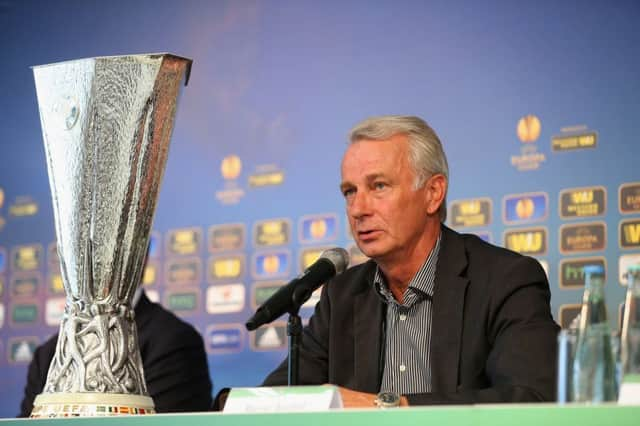Celtic can't expect any gifts from Rainer Bonhof


“I still pay attention to the game in Scotland, but maybe not quite as intensely as I did,” said the man who will return to Glasgow for his club’s Champions League encounter on Wednesday, and whose name was forever prefixed by “urbane” and “suave” for, in part, dragging on cigarettes in the manner of a big-screen super sleuth.
“But what I see scares me. To see teams with the old traditions like Hibernian down in the second tier, after Rangers were abandoned and Hearts had to go and come back, it seems that the waters in Scottish football have been too choppy for some of the bigger vessels.
Advertisement
Hide AdAdvertisement
Hide Ad“Football, to me, is like a sea. In any sea you have waves. Bigger clubs tend to be able to ride those waves as other clubs can be submerged by the waves crashing on them.”
The good ship Monchengladbach certainly has gone down a couple of times with all hands. On the occasion of relegation in 1998, it was with Bonhof on the bridge as manager. That was unbecoming after his “eight wonderful years” as a player, a period during which the defender with one of football’s all-time venomous hits helped the club to a then record three-in-a-row run of titles.
In 1974 he became, at 22 years old, the youngest World Cup winner – having already stashed a European Championship winners’ medal as an unused substitute in the final two years earlier.
A double UEFA Cup winner, only a European Cup final defeat by Liverpool in 1977 deprived him of a real royal flush of a medal set.
That was the sunshine. His vice-presidency at the club, meanwhile, has allowed him to remove the “shadow” that came with the descent to the second tier almost two decades ago. “The circumstances were very bad then; it is a completely different club now,” he said of his ill-starred spell in charge.
Yet all lessons weren’t then learned because demotion was visited on Monchengladbach again in 2007 and, after an immediate return, they only escaped the same fate five years ago through negotiating relegation play-offs. It was a far cry from their current status as one of the country’s big four, reflected in their appearance in the Champions League group stages for a second consecutive season.
“We are doing things properly and have been for a decade, more or less,” Bonhof said. “Before, the circumstances were not really good, with debt, the investment was not right and we didn’t have the full stadium as we do now.”
That full stadium, Borussia-Park, has a 16,000-seater standing area for domestic encounters – about four times the size of the section at a Celtic Park he has heard generates – even in supposedly obligatory sitting mode – an “incomparable atmosphere” for European games. “I think, though, that maybe in our stadium we have something that can compare because we have a really good support. We will fight it out with it being better in Scotland.”
Advertisement
Hide AdAdvertisement
Hide AdBonhof followed former club and country team-mate Berti Vogts to Scotland, but appealed more for his calm authority that took the under-21s to the verge of what would have been an only final stage in the past 20 years – they lost to Croatia in a play-off – before a winless run that stretched to 14 matches led to the SFA calling time on his tenure. As the sequence stretched, so he seemed to suck ever more deeply on his cigs in post-match gatherings, a habit he hasn’t exactly kicked.
“I don’t smoke so much in professional areas – I can’t always anyway – but I do allow myself when I am among my own friends,” said Bonhof. It’s a circle with which he travels to Scotland every two years. Not for the hunting and fishing that appeal to so many. Not when he recoils at how an attempt to sell him on the attractions of the latter turned out when he was with Scotland under-21s. “Fishing didn’t work out properly for me then so I have kept it out of my life.”
Players he worked with at U21s level he is happy to have in his life. This week he has been helping Ian Murray see the workings of Monchengladbach as the former Dumbarton and St Mirren boss has made a trip to the club as part of the studies for his coaching A licence. On Wednesday he will see in the flesh one of his other under-21 proteges in Scott Brown, the revitalised captain of Celtic. A member of his under-21s at the age of 18, Bonhof cautioned the then Hibernian midfielder about the value of keeping his temper after he was almost red-carded for complaining about a refereeing decision all-too-vociferously.
Bonhof did so in typical style, pointing out that while it was wise to contain protests, he had been “born in the Sixties and then everybody protested about something”.
“Scotty is a really good guy,” Bonhof said. “He had some weaknesses then in that side of his game but he was a fighter then and he is a fighter now and I like that. I am still on the side of all my old players from the Scotland set-up.”
Just not on Wednesday when Celtic will hope that their visitors are not, as Half Man Half Biscuit once memorably termed them, Super-califragilisticBorussiaMonchen-gladbach. The sort of quirky line that would no doubt appeal to Bonhof.